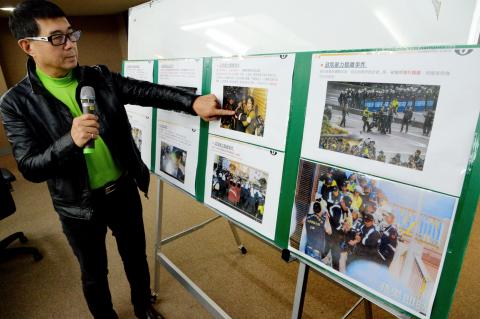Representatives from media worker groups and academics yesterday accused the Taipei City Police Department of using excessive force against reporters in recent protests and trying to evade public scrutiny of what they described as police’s infringement of freedom of the press.
The violent eviction of reporters on March 24, when thousands of protesters occupied the Executive Yuan compound, and on April 28, during an overnight antinuclear sit-in on Zhongxiao W Road, violated the media’s right to report, the representatives told a press conference.
Citing the Constitution, the Universal Declaration of Human Rights and the International Covenant on Civil and Political Rights, the representatives condemned the police’s actions and called on the police to stop impeding with media freedom and using violence against reporters.

Photo: CNA
The National Police Agency and the Taipei City Police Department refused to send officials to the press conference because such an appearance would represent “tacit recognition” of the complaints, said Democratic Progressive Party Taipei City Councilor Hsu Chia-ching (徐佳青), who hosted the press conference.
Hsu said that if the police choose to ignore the Constitution and international covenants and refuse to be held accountable, she would not rule out proposing a regulation in the city council to regulate police treatment of reporters.
The media representatives — from the Association of Taiwan Journalists, the Association of Taipei Photojournalists and independent journalists’ trade unions and television companies’ unions — said the accusations of excessive police force were backed by video footage and photographs.
Some of the photographs and several video clips documented police violence and use of water cannons against journalists and photographers were on view at the press conference.
“The past two months was a period that saw the most police interference with news reporting in recent memory,” Public Television System (PTS) Trade Union president Wang Yen-chieh (王燕杰) said.
At least three PTS reporters were evicted or suffered violence on March 24, Wang said, including one woman who was deliberately targeted with a water cannon, despite standing far away from the demonstrators.
Citing the police’s eviction of journalists from the lobby of the Executive Yuan before they began removing protesters from the building, and the physical assault against two photographers on a pedestrian overpass on April 28, Association of Taipei Photojournalists president Chiou Rung-ji (邱榮吉) said the police had ignored the Council of Grand Justices’ constitutional Interpretation No. 689.
The interpretation stipulates that journalists’ freedom of movement, freedom from bodily and mental harm, and freedom from interference in the public domain must be protected.
“Infringement of journalists’ right to report was primarily why Taiwan’s media freedom ranking in the world dropped this year — from 47th to 48th in the Freedom House ranking and from 47th to 50th in the Reporters Without Borders ranking,” Association of Taiwan Journalists president Chen Hsiao-yi (陳曉宜) said.
A country without respect for media freedom cannot call itself a democratic country, National Taiwan University journalism professor Chang Chin-hwa (張錦華) said.
It was a “stupid move” on the part of the police to try to keep their misconduct from being reported by removing journalists and photographers, because the public could record what was happening with their smartphones.

Alain Robert, known as the "French Spider-Man," praised Alex Honnold as exceptionally well-prepared after the US climber completed a free solo ascent of Taipei 101 yesterday. Robert said Honnold's ascent of the 508m-tall skyscraper in just more than one-and-a-half hours without using safety ropes or equipment was a remarkable achievement. "This is my life," he said in an interview conducted in French, adding that he liked the feeling of being "on the edge of danger." The 63-year-old Frenchman climbed Taipei 101 using ropes in December 2004, taking about four hours to reach the top. On a one-to-10 scale of difficulty, Robert said Taipei 101

Nipah virus infection is to be officially listed as a category 5 notifiable infectious disease in Taiwan in March, while clinical treatment guidelines are being formulated, the Centers for Disease Control (CDC) said yesterday. With Nipah infections being reported in other countries and considering its relatively high fatality rate, the centers on Jan. 16 announced that it would be listed as a notifiable infectious disease to bolster the nation’s systematic early warning system and increase public awareness, the CDC said. Bangladesh reported four fatal cases last year in separate districts, with three linked to raw date palm sap consumption, CDC Epidemic Intelligence

US climber Alex Honnold left Taiwan this morning a day after completing a free-solo ascent of Taipei 101, a feat that drew cheers from onlookers and gained widespread international attention. Honnold yesterday scaled the 101-story skyscraper without a rope or safety harness. The climb — the highest urban free-solo ascent ever attempted — took just more than 90 minutes and was streamed live on Netflix. It was covered by major international news outlets including CNN, the New York Times, the Guardian and the Wall Street Journal. As Honnold prepared to leave Taiwan today, he attracted a crowd when he and his wife, Sanni,

Taiwanese and US defense groups are collaborating to introduce deployable, semi-autonomous manufacturing systems for drones and components in a boost to the nation’s supply chain resilience. Taiwan’s G-Tech Optroelectronics Corp subsidiary GTOC and the US’ Aerkomm Inc on Friday announced an agreement with fellow US-based Firestorm Lab to adopt the latter’s xCell, a technology featuring 3D printers fitted in 6.1m container units. The systems enable aerial platforms and parts to be produced in high volumes from dispersed nodes capable of rapid redeployment, to minimize the risk of enemy strikes and to meet field requirements, they said. Firestorm chief technology officer Ian Muceus said